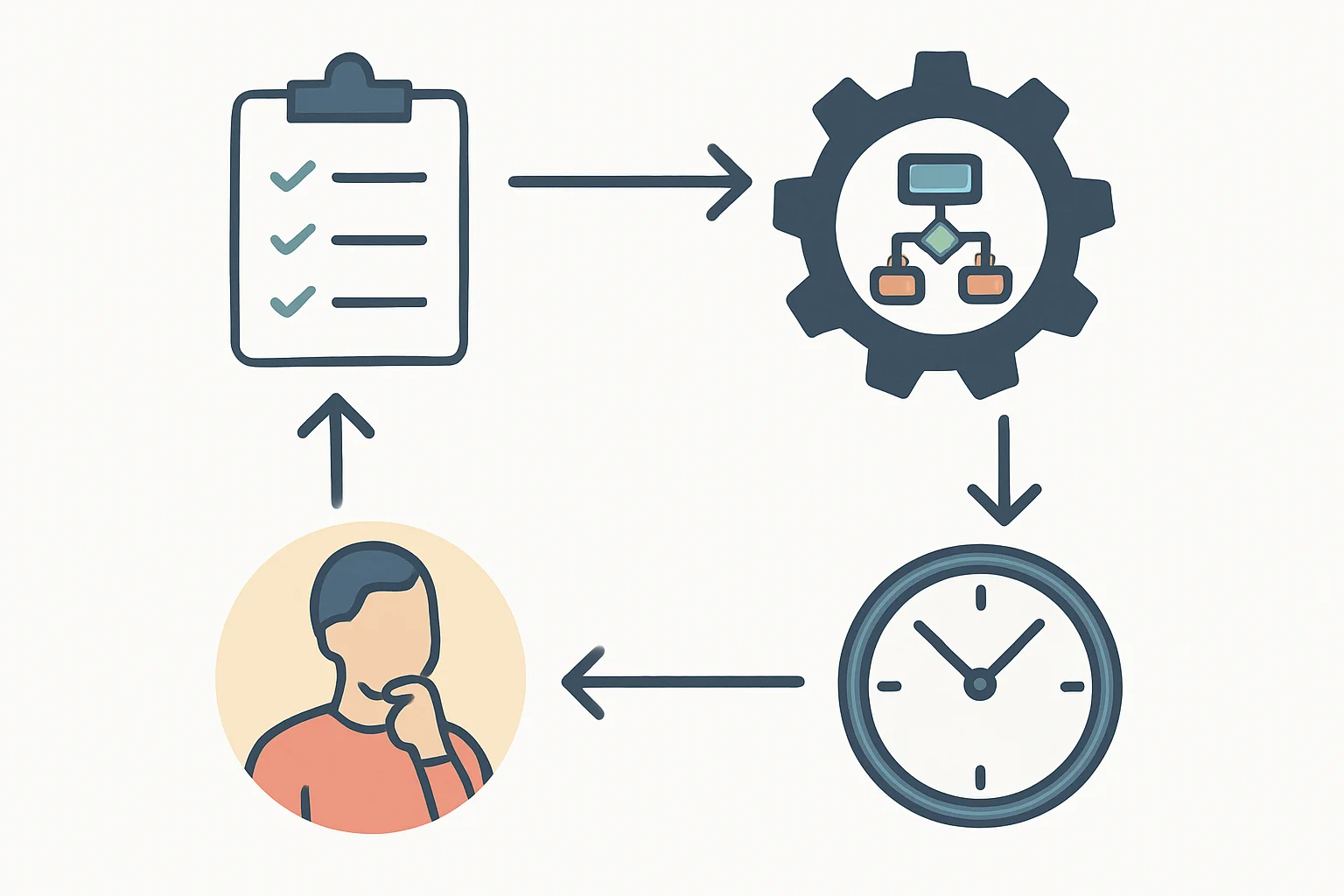Written by the Kairu Team
This article was created by the Kairu team. Kairu helps you stay focused and productive with smart tools, insights, and community support.
Learn more and try Kairu freeTime Management Strategies for Peak Productivity
Master the art of time management with proven techniques that will help you prioritize effectively, eliminate time waste, and achieve more in less time.
Time is your most valuable resource—once spent, it can never be recovered. Yet most people spend their days reacting to whatever comes their way, rather than intentionally designing how they use their time. The difference between high achievers and everyone else often comes down to how they manage this finite resource.
This comprehensive guide will teach you proven time management strategies that will help you take control of your schedule, eliminate time waste, and create the space you need to focus on what truly matters. Whether you're a busy professional, student, or entrepreneur, these techniques will transform how you approach your daily routine.

A well-organized calendar and productivity tools
The Foundation: Understanding Your Time Reality
Before you can improve your time management, you need to understand how you're currently spending your time. Most people dramatically underestimate how much time they waste on low-value activities.

Time audit tracking sheet
Conduct a Time Audit
For one week, track everything you do in 15-minute increments. Be brutally honest about how you spend your time. You'll likely discover:
- Hidden time sinks: Activities that consume more time than you realize
- Productivity patterns: When you're most and least effective
- Interruption frequency: How often you're pulled away from important work
- Energy fluctuations: Times when you feel most and least motivated
The Eisenhower Matrix: Prioritization Mastery
Not all tasks are created equal. The Eisenhower Matrix helps you categorize tasks by urgency and importance:

Eisenhower Matrix with four quadrants
Quadrant 1: Urgent and Important (Do First)
These are crises and deadlines that require immediate attention:
- Project deadlines
- Crisis management
- Last-minute meetings
- Urgent problems
Strategy: Minimize time in this quadrant by planning ahead and preventing crises.
Quadrant 2: Important but Not Urgent (Schedule)
These are your high-leverage activities that drive long-term success:
- Strategic planning
- Relationship building
- Personal development
- Preventive maintenance
Strategy: Spend most of your time here. This is where real productivity happens.
Quadrant 3: Urgent but Not Important (Delegate)
These are interruptions and busy work that don't contribute to your goals:
- Some meetings
- Some emails
- Some phone calls
- Other people's minor issues
Strategy: Delegate, automate, or eliminate these tasks.
Quadrant 4: Not Urgent and Not Important (Eliminate)
These are time wasters that provide no value:
- Excessive social media
- Mindless web browsing
- Some TV watching
- Gossip and idle conversation
Strategy: Eliminate these activities completely.
Time Blocking: The Power of Intentional Scheduling
Time blocking is scheduling specific time slots for specific activities. It transforms your calendar from a reactive tool to a proactive planning system:

Calendar with time blocks
How to Implement Time Blocking
- Block your most important work first: Schedule deep work during your peak energy hours
- Group similar tasks: Batch emails, calls, and meetings together
- Leave buffer time: Include 15-30 minute breaks between blocks
- Be realistic about time estimates: Most people underestimate how long tasks take
- Review and adjust: Reflect on your schedule weekly and make improvements
Types of Time Blocks
Deep Work Blocks
90-120 minute blocks for complex, focused work
Shallow Work Blocks
30-60 minute blocks for routine tasks
Communication Blocks
Dedicated time for emails, calls, and meetings
Planning Blocks
Weekly and daily planning sessions
The 80/20 Rule: Focus on High-Impact Activities
The Pareto Principle states that 80% of your results come from 20% of your efforts. Identify and focus on your highest-leverage activities:

80/20 rule visualization
Identifying Your 20%
Ask yourself these questions to find your highest-impact activities:
- What activities directly contribute to my most important goals?
- What tasks, if done well, would have the biggest positive impact?
- What activities do I enjoy and excel at?
- What tasks create the most value for others?
- What activities have the longest-lasting effects?
Eliminating Time Waste: The Art of Saying No
Time management isn't just about doing more—it's about doing less of what doesn't matter. Learn to say no to time-wasting activities:

Learning to say no to time wasters
Common Time Wasters and How to Eliminate Them
1. Excessive Email Checking
- Problem: Checking email constantly interrupts your focus
- Solution: Check email only 2-3 times per day at scheduled times
- Implementation: Turn off email notifications and use auto-responders
2. Unnecessary Meetings
- Problem: Many meetings are unproductive and could be emails
- Solution: Decline meetings without clear agendas or outcomes
- Implementation: Suggest alternatives like email updates or quick calls
3. Social Media Distractions
- Problem: Social media can consume hours without providing value
- Solution: Set strict time limits and use blocking apps
- Implementation: Schedule specific times for social media use
4. Perfectionism
- Problem: Spending too much time on minor details
- Solution: Set clear standards and deadlines for "good enough"
- Implementation: Use the 80/20 rule to focus on what matters most
Energy Management: Working with Your Natural Rhythms
Time management is also energy management. Your productivity varies throughout the day based on your natural energy cycles:

Daily energy cycle chart
Optimizing Your Schedule for Energy
- Peak energy hours: Schedule your most important work during high-energy periods
- Low energy hours: Use these times for routine tasks and administrative work
- Recovery periods: Build in breaks to recharge and maintain energy
- Sleep optimization: Prioritize quality sleep to maximize daily energy
Weekly Planning: The Foundation of Effective Time Management
A weekly planning session sets you up for success by aligning your daily actions with your bigger goals:

Weekly planning session
The Weekly Planning Process
- Review the past week: What worked? What didn't? What did you learn?
- Set weekly priorities: Choose 3-5 most important goals for the week
- Schedule time blocks: Allocate specific times for your priorities
- Plan for obstacles: Anticipate challenges and create backup plans
- Prepare your environment: Set up your workspace and tools for success
Delegation and Automation: Multiplying Your Time
You can't do everything yourself. Learn to delegate tasks that others can do and automate repetitive processes:

Delegation and automation strategies
What to Delegate
- Tasks you're not good at: Focus on your strengths
- Tasks that don't require your unique skills: Free up time for high-value work
- Administrative tasks: Email management, scheduling, data entry
- Tasks that can be taught: Create systems and train others
What to Automate
- Email filters and rules: Automatically sort and prioritize messages
- Bill payments: Set up automatic payments for recurring expenses
- Social media posting: Use scheduling tools to batch content
- Data backups: Automate file and system backups
- Task reminders: Use apps to remind you of important deadlines
Creating Time Management Systems
The most successful people don't rely on willpower—they create systems that make good time management automatic:

Time management systems
Essential Time Management Systems
1. The Morning Routine
Start each day with intention by creating a consistent morning routine:
- Review your daily priorities
- Complete your most important task first
- Set up your workspace for success
- Practice gratitude or reflection
2. The Evening Review
End each day by preparing for tomorrow:
- Review what you accomplished
- Plan your top 3 priorities for tomorrow
- Prepare your workspace and materials
- Reflect on what you learned
3. The Weekly Review
Take time each week to assess and adjust:
- Review your goals and progress
- Plan the upcoming week
- Clean up your systems and workspace
- Celebrate wins and learn from setbacks
Overcoming Common Time Management Challenges
1. Procrastination
Procrastination is often a sign of unclear priorities or overwhelming tasks:
- Break down large tasks: Make them more manageable
- Use the 5-minute rule: Commit to working for just 5 minutes
- Create accountability: Share your goals with others
- Address underlying fears: Often procrastination masks fear of failure
2. Interruptions and Distractions
Create boundaries and systems to protect your focus time:
- Use "Do Not Disturb" modes: Block notifications during deep work
- Set office hours: Establish specific times for meetings and calls
- Create physical barriers: Close your door or use headphones
- Communicate boundaries: Let others know when you're unavailable
3. Overcommitment
Learn to say no and manage expectations:
- Use the 24-hour rule: Wait before committing to new requests
- Check your calendar first: Don't commit without checking availability
- Offer alternatives: Suggest other times or people who can help
- Practice saying no: It's a skill that gets easier with practice
Measuring and Improving Your Time Management
What gets measured gets managed. Track your time management effectiveness:

Time management metrics and tracking
Key Metrics to Track
- Deep work hours: Time spent in focused, uninterrupted work
- Task completion rate: Percentage of planned tasks completed
- Interruption frequency: How often you're pulled away from important work
- Energy levels: Track when you feel most and least productive
- Goal progress: Movement toward your most important objectives
Conclusion: Building Your Time Management Mastery
Effective time management is a skill that develops over time. Start with one or two strategies that resonate with you, implement them consistently, and gradually add more techniques to your toolkit.
Remember that the goal isn't to be busy—it's to be productive. Focus on doing the right things at the right time, and you'll find that you can achieve more in less time while experiencing greater satisfaction and reduced stress.
The most successful people aren't those who work the hardest—they're those who work the smartest. By mastering these time management strategies, you'll join their ranks and create the space you need to focus on what truly matters in your life and work.
Ready to Transform Your Time Management?
Start implementing these strategies today. Choose one technique to focus on this week, and gradually build your time management system. The compound effect of these small improvements will transform your productivity and create the life you want.
Your time is precious. Use it wisely.